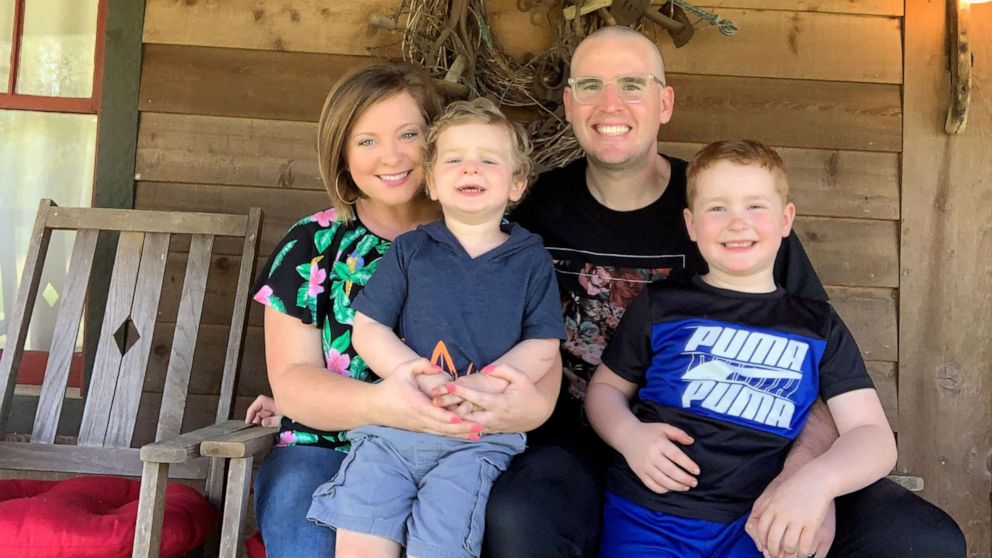[ad_1]
Noah and Ivy Cleveland were packed and ready to go for weeks before a Feb. 7 flight to Guangzhou, China, they hoped would change their lives.
They had been excited about making the trip for nine months — ever since their adoption agency told them they’d been matched with a little girl they could soon call their own: 3-year-old Ruby.
“We just knew — from the very first time we got her file — that she was our daughter,” Ivy Cleveland said.
She and her husband had taken all of February off from work. They had lined up six different babysitters to take care of their two biological sons, Samuel, 6, and Zeek, at home in McDonough, Georgia, while they would be in China for two weeks.
And for Ruby, they would take a special suitcase — one covered with signatures from people who had helped them pay the costs of adopting her.
Noah Cleveland, a musician, gives concerts around the country, and everywhere he went he would put the suitcase out to collect money. When someone donated, he would ask that they sign the suitcase.
“We wanted her to one day see how many people all over the United States love her, and wanted to invest in her,” he said.
But just days before they were to leave, they got an email from their adoption agency, Holt International, that said the trip to China had been called off amid growing concerns about the novel coronavirus outbreak.
“We finally got to the part in our adoption process that was super exciting,” Ivy Cleveland said. “And in a blink of an eye, all of that got taken away. And then you go from excitement, to devastation, to questioning everything.”
The Clevelands are one of about 20 families using the Holt International who should have gone to China by now and returned with their new children. But because of a “State Department ‘Do Not Travel’” advisory, they are stuck in limbo, not knowing when they can get Ruby and bring her back.
“Even though I did not carry Ruby in my body for nine months, I am just as attached to this child as I was to my two boys that I carried within my body,” Ivy Cleveland said.
In her three years, Ruby has experienced more than her share of adversity. At just six months, she was abandoned behind a toilet at a hospital. And although the little girl does not have the new coronavirus sweeping through China, Ivy Cleveland is worried.
“As a mama, knowing that she’s in a country where this coronavirus is so bad, that’s scary for me,” she said. “That’s my daughter, and I want her with me. I want to bring her home.”
According to the most recent numbers from the World Health Organization on March 4, there are 80,422 confirmed cases of COVID-19 in China alone. There have also been 2,984 deaths.
A State Department spokesperson told ABC News U.S. officials have been in “regular contact” with China’s adoption authorities.
“We are advising all U.S. citizens, including adoptive parents, not to travel to China at this time,” the spokesperson said. “However, no adoption case has been placed ‘on hold.’ The department is working closely with U.S. accredited adoption service providers (agencies) and adoptive families to facilitate communication and provide all appropriate assistance.”
The State Department informed the public in a Jan. 31 notice that the U.S. Consulate in Guangzhou, where intercountry adoption cases from China to the U.S. are processed, has a “reduced” capacity to provide services.
Susan Soonkeum Cox, vice president of policy and external affairs for Holt International, said the State Department response has been “exceptional.”
“They have made it very clear to us that adoption and processing adoption — once it becomes possible again — is going to be one of their highest priorities,” Cox told ABC News.
Aside from China, Holt International facilitates adoptions in other countries where there have been outbreaks of COVID-19, including South Korea, Vietnam, Thailand and the Philippines.
As of March 4, in South Korea, the number of confirmed COVID-19 cases skyrocketed from 31 to 5,328 in just two weeks , according to WHO. The outbreak is not as bad in the other three countries.
“We are bracing ourselves for the fact that it’s now in all the countries in Asia where we have programs,” Cox said.
According to a press release, Holt International’s partner orphanage in Wuhan, the epicenter of COVID-19, houses 600 children. Cox — who has been the liaison between the government and families like the Clevelands — said they are all healthy.
“The news that their children are safe and no one has been ill — that’s probably the most important information we can give them,” Cox said.
Ivy Cleveland said she has peace of mind knowing her daughter is safe, but it’s been “difficult” explaining to her older son why he can’t meet his sister yet.
“Now he’s doubting, ‘Do I even have a sister?'” she said. “‘Are you going to bring her home?’ That’s been very hard to navigate through.”
The couple is trying to remain optimistic, though they say they’re “thankful” they didn’t go to China now and end up getting sick.
In a way, Noah Cleveland said, it makes Ruby’s journey even more special.
“One day, she will have an incredible story to tell people,” he said. “You know, ‘Look what my parents did to get to me.’ And hopefully that will encourage her.”
ABC News’ Conor Finnegan contributed to this report.
[ad_2]
Source link

